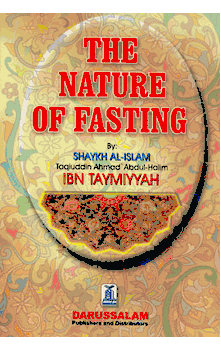Description
ISBN: None
Author: Shaykh al Islam Ibn Taymiyyah
Publisher: Sootaree's Center (2007)
Pages: 39 Binding: Paperback
Description from the publisher:
Ibn Taymiyyah said:
From the things that prevents one from making Tawbah is; paying little concern to the sins one comments, and belittling the sins one falls into; (i.e.) Thinking one does not have to make repentance from them and considering them carrying a light punishment.The Scholars mention that the act of seeking repentance is deemed obligatory for every sin committed.
About Sheikh ul Islam Ibn Taymiyah
Shaykh al-Islam Taqi ud-Din Abu'l-Abbas Ahmad Ibn al-Halim ibn Abd al-Salam Ibn Taymiyah al-Hanbali was born in , 661 AH (1263 AC) in Haran, which is now in Eastern Turkey, near the border of northern Iraq.
His family had long been renowned for its learning, among his teachers, was Shams ud-Din Al-Maqdisi, first Hanbali Chief Justice of Syria following the reform of the judiciary by Baibars. The number of Ibn Taimiyah's teachers exceeds two hundred. Ibn Taimiyah was barely seventeen, when Qadi Al-Maqdisi authorized him to issue Fatwa (legal verdict). Qadi remembered with pride that it was he who had first permitted an intelligent and learned man like Ibn Taimiyah to give Fatwa. At the same age, he started delivering lectures. When he was thirty, he was offered the office of Chief Justice, but refused, as he could not persuade himself to follow the limitations imposed by the authorities.
Imam Ibn Taimiyah's education was essentially that of a Hanbali theologian and jurisconsult. But to his knowledge of early and classical Hanbalism, he added not only that of the other schools of jurisprudence but also that of other literature.
He had an extensive knowledge of Quran, Sunnah, Greek philosophy, Islamic history, and religious books of others, as is evident from the variety of the books he wrote.
Reviews
You may also be interested in ...
 The Outstanding Answer on Visiting the Graves : Al Jawab al Bahir (Shaykh al Islam Ibn Taymiyah)
The Outstanding Answer on Visiting the Graves : Al Jawab al Bahir (Shaykh al Islam Ibn Taymiyah) The Creed of Al-Wasitiyyah : A Textbook on Orthodox Sunni Creed (Shaykhu'l-Islam Ahmed ibn Taymiyyah)
The Creed of Al-Wasitiyyah : A Textbook on Orthodox Sunni Creed (Shaykhu'l-Islam Ahmed ibn Taymiyyah) The Nature of Fasting (Ibn Taymiyyah)
The Nature of Fasting (Ibn Taymiyyah) The Goodly Word : al kalim al tayyib (Ibn Taymiyya, Ezzeddin Ibrahim, Denys Johnson Davies)
The Goodly Word : al kalim al tayyib (Ibn Taymiyya, Ezzeddin Ibrahim, Denys Johnson Davies) Seeking Forgiveness (Ibn Taymiyyah)
Seeking Forgiveness (Ibn Taymiyyah)
















